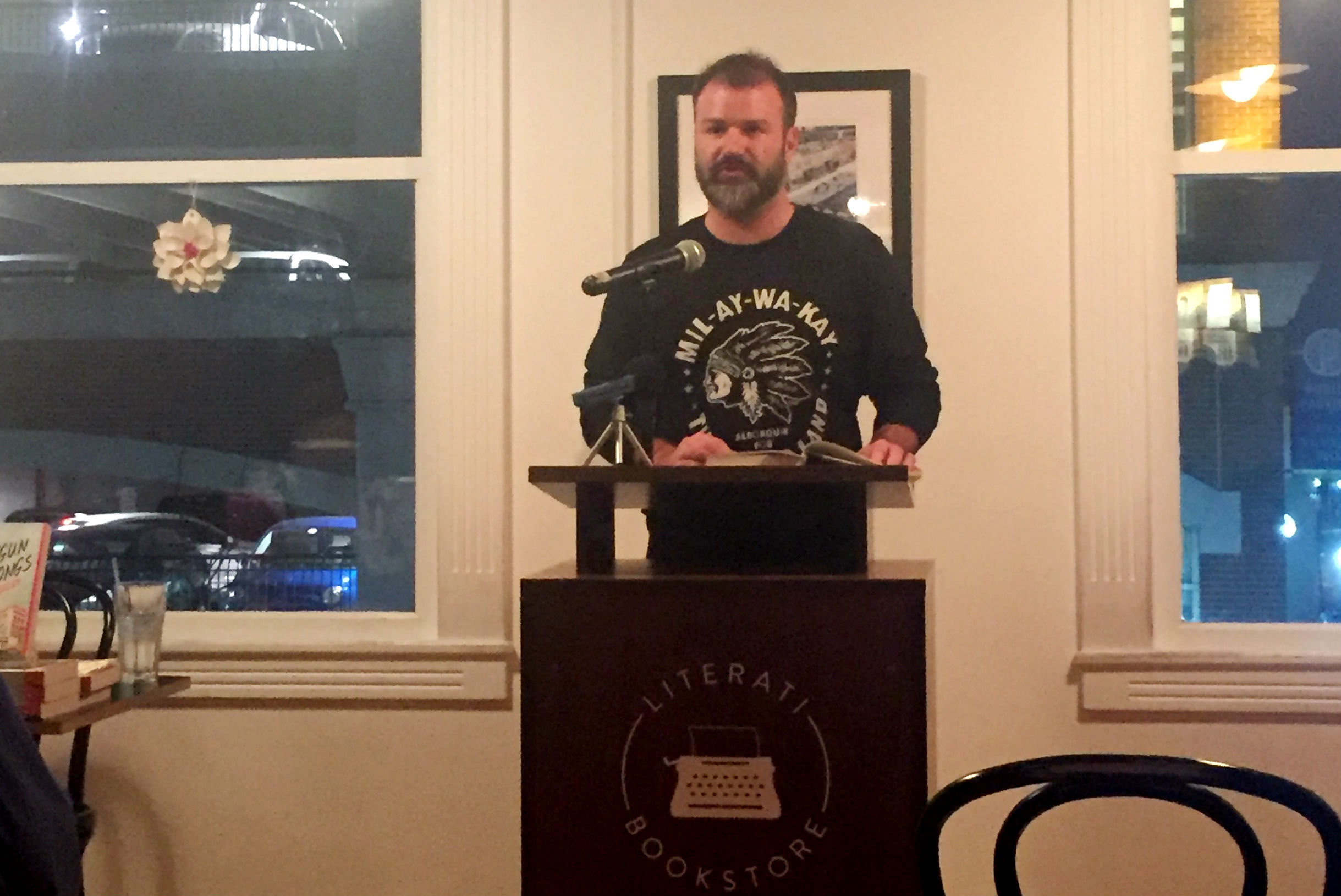Small Towns, Universal Emotions: Nickolas Butler at Literati
“I couldn’t write about something like the New York City social scene, because I know nothing about it,” said Nickolas Butler frankly at his reading at Literati on Wednesday, March 8. Butler’s third book, The Hearts of Men, has just been released and it shares a rural Wisconsin setting with his previous two books, Shotgun Lovesongs and Beneath the Bonfire.
Butler himself lives outside of Eau Claire, Wisconsin, with his family and is able to brilliantly capture rural Midwestern life in his work, as only someone who truly lives it would be able to do.
“In part, I write about these characters and this setting because that’s what I’m familiar with,” said Butler. “Although I have a very nice house and a very nice property, it’s just a little bit down the road until I’m in what is essentially rural poverty. I go into Cleghorn, which is the nearest town, and there’s literally one intersection and there’s a bar and a taxidermy shop.” He laughed a little. “You can go in [to the bar], and you and four of your buddies could drink as much as you possibly could and there’s no way that you could ever run a tab up in there that’s more than $65.”
A lot of people don’t see places like this. Unless you live there or grew up there, there are not many reasons that one might find themselves in rural Wisconsin or Minnesota or even Michigan, for that matter. But this is the environment that Butler shares with readers and the people he has chosen to capture in his writing. And by doing it as well as he does, these gritty, unglamorous people that inhabit these small, cold towns in his books are given a special sort of grace.
The Hearts of Men spans over 50 years and tells the story of two Boy Scouts who find themselves back at their childhood Scout camp after decades away. One is a troubled Vietnam vet, the other a successful business executive. Butler uses them to explore, he said, “how well one can uphold the morality of an ancient American institution like the Boy Scouts, the Girl Scouts, 4-H, [and things like that over the course of a life.” These men grapple with tough ethical decisions and, like anyone, are shaped by the small, tender, and terrifying moments that come together to form a life.
Butler is a no-frills, plain-spoken sort, and he read right from the beginning of The Hearts of Men. The book opens with a young boy, Nelson, waking up at Boy Scout camp, going through the motions of starting a fire and lugging water. Butler was a Boy Scout and spent weeks at a time at summer camp, and he expertly evokes the feelings of camping in his writing: the thrill of peeing on a tree, the bone-permeating chill of the early morning, the increased difficulty of every task that would have been so easy to do in the comforts of one’s own home.
From there, the book moves into the story of Nelson’s 13th birthday party, to which all the boys in the neighborhood have been invited, but none show up. There is little sadder than a child waiting expectantly for others to arrive at their birthday and no one coming, and Butler captures the crushing disappointment of this very well. Nelson’s staunchly Midwestern parents attempt to remedy the situation in their own way -- his mother, comforting; his father, harsh -- but the only thing that can lessen the blow is the eventual, belated arrival of a single neighbor boy, who gifts Nelson with a homemade birchbark basket.
Butler stopped the reading here, leaving listeners to wonder if this neighbor would become a main character in the book or just a passing emblem, but leaving no doubt in our minds that The Hearts of Men will be as thoughtful and heart-wrenching as Butler’s previous books.
If you think the literature world can be pompous, Butler is a breath of fresh air. He enjoys writing, he’s good at it, and he writes what he knows about. One attendee at the talk asked him about his writing process. “I’ll sit on idea for years,” Butler said. “And then I notice that sometime soon I’m going to stop receiving publishing payments or royalty checks and I say, 'Well, I guess I should write another book.’”
He admits that he doesn’t run in literary circles. “I don’t have a lot of friends in the publishing world,” he said. “Actually, I don’t have a lot of friends.”
Maybe the royalty checks dried up recently for Butler because on Wednesday he revealed his next book is about the relationship between a grandparent and a grandchild. He’s also stewing on an idea for a book set on a coffee farm.
“I won’t be able to write that until I up and move my family to Panama to live on a coffee farm for a year or two though,” he said, chuckling. “I have to go experience it.”
Elizabeth Pearce is a Library Technician at the Ann Arbor District Library.



































